News & Events
For the latest department news, information on upcoming events and commentary on recent political news and scholarship, please visit the SUNY Plattsburgh Department of Political Science Facebook page.
Political Science Major Published in Academic Journal
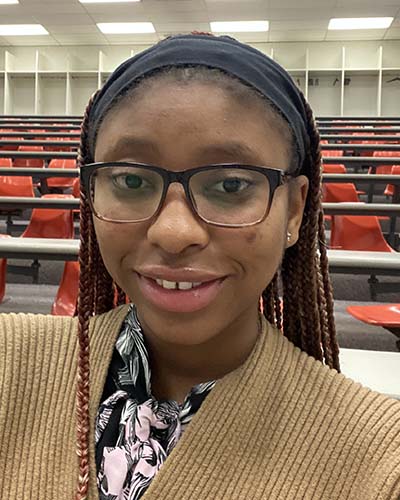 Peculiar Joseph, a triple major in political science, economics and biomedical sciences,
was recently published in the academic journal Teaching History: A Journal of Methods. Joseph’s article, “Is Including Games in a College Class Beneficial?,” discusses
her experience playing a major role in a simulation of the French Revolution in her
Introduction to Political Thought course — a class that all majors take — in the spring
2023 semester. Joseph writes that the simulation “was an effective way for students
to learn about the French Revolution and political thought, and have fun with it.
But more than just fun, playing the RTTP game was a challenging task in a good way.”
Peculiar Joseph, a triple major in political science, economics and biomedical sciences,
was recently published in the academic journal Teaching History: A Journal of Methods. Joseph’s article, “Is Including Games in a College Class Beneficial?,” discusses
her experience playing a major role in a simulation of the French Revolution in her
Introduction to Political Thought course — a class that all majors take — in the spring
2023 semester. Joseph writes that the simulation “was an effective way for students
to learn about the French Revolution and political thought, and have fun with it.
But more than just fun, playing the RTTP game was a challenging task in a good way.”
Read Peculiar Joseph’s full article
Law & Justice Major Discusses Capital Hill Internship
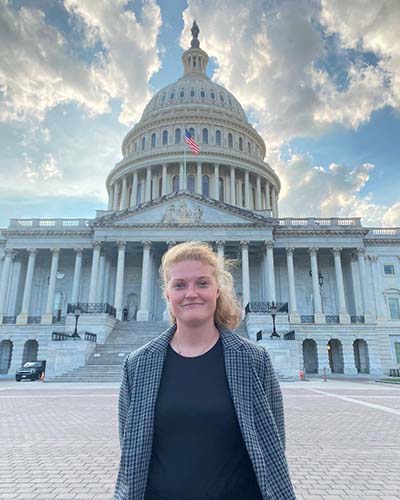 Mary Stockman, a senior law and justice and criminal justice double major, is currently
completing a congressional internship on Capitol Hill in Washington, D.C. A recent
news story profiles Mary, covering her experiences in D.C., how she has witnessed
political history and how her internship fits into her academic and professional trajectory
at SUNY Plattsburgh.
Mary Stockman, a senior law and justice and criminal justice double major, is currently
completing a congressional internship on Capitol Hill in Washington, D.C. A recent
news story profiles Mary, covering her experiences in D.C., how she has witnessed
political history and how her internship fits into her academic and professional trajectory
at SUNY Plattsburgh.
Read more about Mary Stockman’s Fall 2023 Internship in Washington, D.C.
Interview with Dr. Courtney Nava, Assistant Professor
 The political science department is excited to welcome Dr. Courtney Nava to the departmental
faculty as an assistant professor. Dr. Nava joins us from the University of Colorado,
where she completed her Ph.D. in the spring of 2023. Dr. John McMahon conducts a brief
interview with Dr. Nava to introduce her to the department and to campus.
The political science department is excited to welcome Dr. Courtney Nava to the departmental
faculty as an assistant professor. Dr. Nava joins us from the University of Colorado,
where she completed her Ph.D. in the spring of 2023. Dr. John McMahon conducts a brief
interview with Dr. Nava to introduce her to the department and to campus.
Dr. John McMahon talks to Dr. Nava about her interest in political science, what students can expect to learn in her upcoming courses as well as a profile of Dexter and Willow, “the most perfect dogs to ever exist.”
Read our Q&A with Dr. Courtney Nava
A Political Analysis of Elon Musk & Peter Thiel
Dr. John McMahon recently published a co-authored essay on Elon Musk and Peter Thiel in a series on Silicon Valley from the Goldsmiths (University of London) Political Economy Research Centre.
The piece contrasts the grandiose rhetoric of Musk, Thiel, and Silicon Valley ideas more broadly — for instance, the idea that innovation promises a “magical and technical-scientific fix to humanity’s problems” — with the forms of exploitation these founders directly or indirectly uphold in their companies and their ideologies. With Elon Musk’s recent purchase of Twitter and Peter Thiel’s heavy involvement in the 2022 election cycle, McMahon and his co-authors examine the political realities behind the enchanting myths of Silicon Valley.
Read “Silicon Valley's Civilizational Politics and the Depoliticization of Work”
Law & Justice Student Presents at Campus-Wide Teach-In
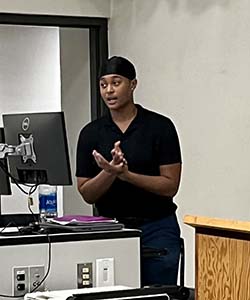 Misa Dowdell (’23), a senior law and justice major and legal studies minor, led a
solo session at SUNY Plattsburgh’s Black Solidarity Day Social Justice Teach-In on
November 7.
Misa Dowdell (’23), a senior law and justice major and legal studies minor, led a
solo session at SUNY Plattsburgh’s Black Solidarity Day Social Justice Teach-In on
November 7.
Dowdell’s session, “I Heart CRT,” examined the history of redlining and housing discrimination in America and connected that history to present-day racial educational inequity, mass incarceration, and economic inequality. The interactive session, with an audience of over fifty students, staff, and faculty, invited participants to connect Dowdell’s presentation to their own experiences and observations, and fostered generative conversation.
Dowdell’s presentation was one of over sixty sessions comprising the campus-wide Social Justice Teach-In in recognition of Black Solidarity Day. The all-day event featured programming about racial justice, anti-racism, and social justice. with events led by students, staff, faculty, and community groups, including the Mayor of Plattsburgh and the former director of the Adirondack Diversity Initiative.
Recent Developments in Ukraine
Dr. Daniel Lake presented “Recent Developments in Ukraine” for Tuesday Talks on October 18, 2022.
After the Russian invasion of Ukraine was stopped in late March and Russian forces retreated from Kyiv, Chernihiv, Sumy, and Kharkiv in early April, the war settled into a slow-motion grind. While Russian forces were able to conquer some additional territory in the Donbas and were finally able to gain full control of Mariupol, they suffered very high casualties doing so. After several months of apparent stalemate, Ukrainian armed forces counter-attacked in Kherson Oblast (South Ukraine) on Aug. 29 and started to push the Russian forces in the area back. On Sept. 6, Ukrainian forces launched a second offensive in Kharkiv Oblast (NE Ukraine) which quickly broke through the Russian lines, liberating thousands of square miles of Ukrainian territory in Kharkiv Oblast and the Donbas.
In this presentation, Dr. Daniel Lake summarizes recent developments in the war and explains why Ukraine's forces were able to launch such successful offensives after several months of apparent stalemate on the battlefield. He also discusses recent developments such as the partial mobilization of reserves called by Russian President Vladimir Putin and the annexation of Kherson, Zaporizhzhia, Donestsk, and Luhansk Oblasts, and their political and military ramifications.
View Dr. Lake’s presentation on YouTube
Dr. Daniel R. Lake is an associate professor of political science and chair of the political science department. He teaches classes on international relations, with a particular interest in American foreign policy, national security, and war. His research has focused on topics related to international conflict and security including the use of airpower during the Kosovo Crisis, the decline of interstate war, and the impact of technological change on military operations. He is the author of The Pursuit of Technological Superiority and the Shrinking American Military (2019). He is also a former military intelligence officer in the U.S. Army and a veteran of Operation Desert Storm.
The 2022 Election & You!
The Department of Political Science organized a panel discussion of “The 2022 Election and You” on October 13 featuring four SUNY Plattsburgh alumni who are all active in N.Y. and local politics and are currently serving as elected officials. The panelists included Kimberly Davis ’06, Clinton County Treasurer; David Rodriguez DeCancio ’93, Town of Bethlehem Board Member and Senior Assistant to NYS Assembly Speaker Carl E. Heastie; Christopher Rosenquest ’00, Mayor of Plattsburgh; and Matthew Veitch, ’94, Saratoga Springs Supervisor. Read about the panel in Cardinal Points
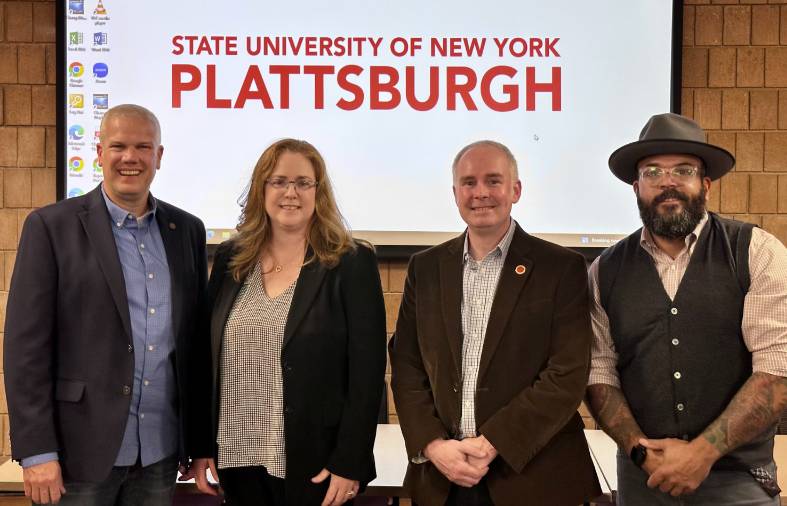
Image from left to right: David Rodriguez DeCancio, Kimberly Davis, Matthew Veitch, Christopher Rosenquest
The War in Ukraine: A Political-Military Analysis
Dr. Daniel Lake presented “The War in Ukraine: A Political-Military Analysis” for Tuesday Reflections on April 5, 2022. In it, he focused on Russian President Vladimir Putin and the nature of the Russian regime (authoritarian and kleptocratic) to explain why Ukraine was invaded and why the invading Russian troops have not performed well. He also discussed recent developments such as the Russian withdrawal from Kyiv and the extensive war crimes revealed by that withdrawal and how those events are likely to affect how this war proceeds and ends.
View the April 5, 2022 presentation recording on YouTube
Dr. Daniel R. Lake is an associate professor of political science and chair of the political science department. He teaches classes on international relations, with a particular interest in American foreign policy, national security, and war. His research has focused on topics related to international conflict and security including the use of airpower during the Kosovo Crisis, the decline of interstate war, and the impact of technological change on military operations. He is the author of The Pursuit of Technological Superiority and the Shrinking American Military (2019). He is also a former military intelligence officer in the U.S. Army and a veteran of Operation Desert Storm.
Film Screening & Discussion: Don’t Look Up
On Tuesday, March 29, the campus community was invited to watch the Academy Award-nominated film Don’t Look Up (2021), about two low-level astronomers who go on a media tour and lobby the president to warn humanity of an approaching comet that is set to destroy planet Earth. The screening was followed by a moderated discussion about climate change and about the politics of satire in film.
This event was sponsored by Pi Sigma Alpha Political Science Honor Society; Late Night for the Planet; the Center for Earth and Environmental Science; and the Department of Political Science.
Read: Movie Night Explores Climate Issues, Cardinal Points, Apr. 8, 2022
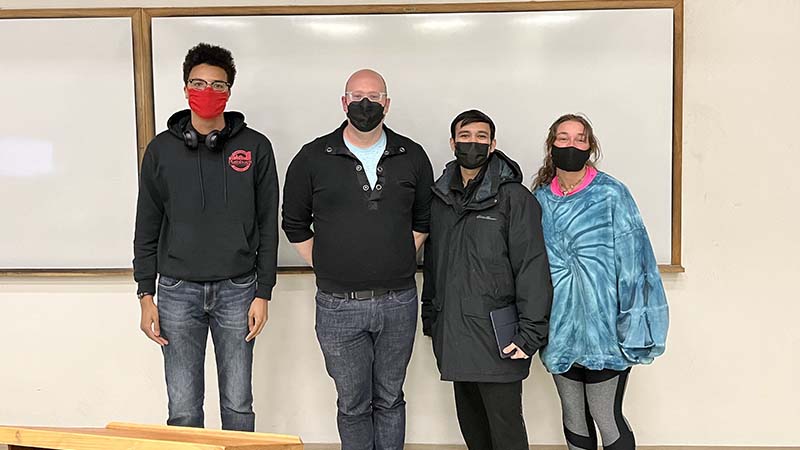
Image, from left to right: Mac-Olivier Lalanne, Pi Sigma Alpha Honor Society member; Dr. John McMahon; Saugat Gautam, Pi Sigma Alpha Honor Society member; Mia Morgillo, “Late Night for the Planet”. Photo by Luca Gros.
The Russian Invasion of Ukraine: A Preliminary Political-Military Analysis
When Russia invaded Ukraine on February 24, 2022, it constituted a shocking breach of international law and European peace. As the first attempt at outright conquest of an independent country by a neighbor, and the largest offensive military operation in Europe since World War II, it is important to understand what is going on and why.
Dr. Daniel Lake presented a preliminary analysis of the political and military dimensions of this invasion to try to shed some light on key questions. These included why Russian President Vladimir Putin ordered the invasion, what his goals were, and why it has so far turned out badly for Russian forces and President Putin both militarily and politically.
View the presentation recording on YouTube
Critical Issues Forum: The Supreme Court’s “Shadow Docket”
- Date: Monday, September 27 at 6 p.m.
- Location: Yokum 205
On September 1, the U.S. Supreme Court allowed Texas’ new near-total abortion ban go into effect. It did so on what has been termed its “shadow docket.” What is the “shadow docket?" How is the “shadow docket” different from the way the Supreme Court usually decides cases? Should we be concerned about it? What exactly did the Supreme Court decide in the Texas case? What other constitutional rights have been decided on the “shadow docket?” This Critical Issues Forum will answer these and other questions about the Supreme Court’s controversial, increasingly frequent, and — some say dangerous — way of deciding hugely consequential cases.
This event is sponsored by the Honors Program, the history department and the political science department.
Two New Publications from Prof. John McMahon
Magicians of the Twenty-First Century: Utopia, Work & Domination in Silicon Valley
What is the political theorist to make of self-characterizations of Silicon Valley as the beacon of civilization-saving innovation? Through an analysis of “tech bro” masculinity and the closely related discourses of tech icons Elon Musk and Peter Thiel, we argue that undergirding Silicon Valley’s technological utopia is an exploitative work ethic revamped for the industry’s innovative ethos. On the one hand, Silicon Valley hypothetically offers a creative response to what Max Weber describes as the disenchantment of the modern world. Simultaneously, it depoliticizes the actual work necessary for these dreams to be realized, mystifying its modes of domination.
Crandall, Emily K., Rachel H. Brown, and John McMahon. "Magicians of the Twenty-first Century: Enchantment, Domination, and the Politics of Work in Silicon Valley." Theory & Event 24, no. 3 (2021): 841-873. doi:10.1353/tae.2021.0045.
Rosa Luxemburg & the Primitive Accumulation of Whiteness
One of Rosa Luxemburg’s signal contributions to the critique of capitalism is her theorization of primitive accumulation as an ongoing imperial practice that is endemic to capitalism, rather than a historical phase belonging to capital’s pre-history. This dimension of her thought marks a turning point for theorizing capital’s violence. Indeed, a variety of contemporary thinkers have since built upon Luxemburg’s insights to interrogate the continuity of primitive accumulation in the present. Our paper extends Luxemburg’s distinctive intervention beyond its current application by interweaving her work on primitive accumulation with analyses of racial capitalism, the logic of global coloniality, and race-making in medieval Europe. We begin by examining how racial hierarchy and the historical production of whiteness complicate, supplement, and are bound up with Luxemburg’s prescient analysis of primitive accumulation. We then analyze several (re)constitutions of whiteness to conceptualize how they mediate and enable racial capitalism, from the European Middle Ages to our contemporary moment of neoliberal imperialism. Ultimately, we claim that creolizing Luxemburg enables the theorization of the primitive accumulation of whiteness, a concept that elucidates a dynamic by which racial capitalism operates. This concept highlights how processes of racialization, particularly the consolidation of whiteness as a racial-civilizational category, are necessary to ongoing imperial accumulations of capital; situates Luxemburg as a theorist of racial capitalism; and ensures that accounts of early modalities of whiteness in medieval race-making and later in neoliberal modes of imperialism do not understand whiteness or race as phenomena separate from capital.
Issar, Siddhant, Rachel H. Brown, and John McMahon. 2021. “Rosa Luxemburg and the Primitive Accumulation of Whiteness.” In Creolizing Rosa Luxemburg, eds. Jane Anna Gordon and Drucilla Cornell. Lanham, MA: Rowman & Littlefield Publishers, 343–69.
Department Inducts New Members to Pi Sigma Alpha
In May 2021, the political science department was thrilled to induct a group of 10 new members into the campus chapter, Omicron Omega, of Pi Sigma Alpha, the National Political Science Honors Society.
Given the academic challenges of remote and hybrid learning and the deep personal challenges of the pandemic, the achievements of this group of students is incredibly impressive. We look forward to working with these leaders in the department as we return to mostly in-person classes and other campus programming in the next academic year.
Befitting this school year, the induction ceremony took two forms: a recorded video induction (available at this link), and a small in-person induction outside Hawkins Hall. Congratulations to the 2021 inductees to Pi Sigma Alpha: Lucy Allen, James Allison, Samantha Alvarez, Crystal Baez, Kate Davis, Saugat Gautam, Mac-Olivier Lalanne, Andrew Lembo, Declan O’Connor, and Nicholas Von Rosk.
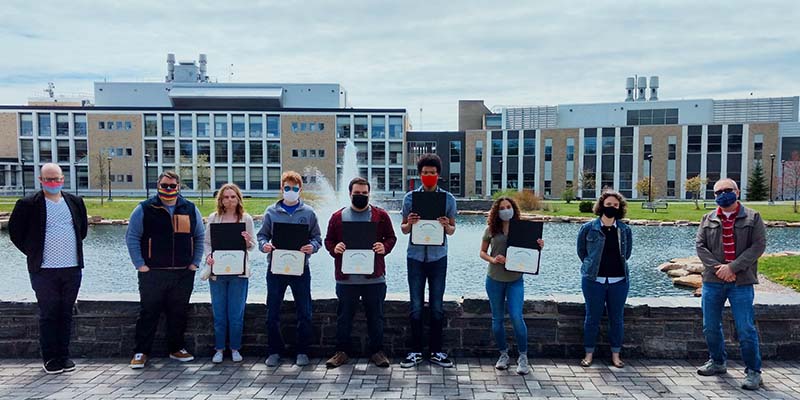
Prof. Lake Presents “Insurrections at the Capitol”
Dr. Daniel Lake gave a presentation on the breach of the U.S. Capitol which took place on January 6, 2021, to the Rotary Club of Plattsburgh on January 13, 2021. Dr. Lake’s presentation focuses on putting that event in context, looking at how the Republican Party and American conservatives have been affected by changes in American society in recent decades. He discusses how demographic, social and political changes that threaten to marginalize the Republican Party have combined with institutional factors such as gerrymandering and winner-take-all primaries and the rise of partisan media to create a growing and increasingly violent right-wing extremist movement in the U.S.
Watch Dr. Daniel Lake Rotary Presentation
Claudia Theagene & Prof. McMahon Publish “In the Classroom” Essay
Political Science senior Claudia Theagene and faculty member Dr. John McMahon recently published a piece in the “In the Classroom” blog of the Consortium for Undergraduate Law and Justice Programs. Their essay, “Why students of law and justice should read Octavia Butler’s Parable of the Sower,” discusses the importance and meaning of Butler’s Afrofuturist novel for courses in politics, law and justice. The article is based on their experience taking and teaching PSC 371 African American Political Thought course in the Fall 2020 semester. Theagene and McMahon analyze how the novel teaches its readers about oppression, racism, capitalism, policing and why its engagement with these ideas is beneficial to students and teachers.
Read “Why Students of Law and Justice Should Read Octavia Butler’s Parable of the Sower”
Election Night: Virtual Watch Party with the Experts
Tuesday, November 3 beginning at 7 p.m.
We understand that sometimes the news can be overwhelming, so to help clear up questions you may have on election night, log on to the Election Headquarters Webinar while watching safely from your home. Get your questions answered and hear analysis from local experts about the election.
About the panel: James Sherman, assistant director of community living and the professors from the political science department will be watching election results come in live. The panel will be accepting questions from our audience.
As you’re watching the results, be sure to leave our webinar up and running in the background, tune in for election analysis and get your election day questions answered. Event starts at 7 p.m.
- What is the Electoral College?
- What is an Elector?
- What in the world is going on in Florida?
Join the webinar to Ask Questions: https://plattsburgh.zoom.us/j/99731083490
| Panelist | Specialty/Focus | On Air |
|---|---|---|
| Dr. Raymond Carman | Constitutional Law and the Courts | 7 – 8 p.m. |
| Dr. Lucia Manzi | Comparative Politics | 7:30 – 8:30 p.m. |
| Dr. Daniel Lake | Comparative Politics and International Relations | 8 – 9:30 p.m. |
| Dr. John McMahon | Political Theory/Race and Gender Politics | 9 – 10 p.m. |
Celebration of Graduates, Spring 2020
The Department of Political Science held a virtual ceremony to celebrate the Spring 2020 Plattsburgh graduates who majored in Political Science. The ceremony included trivia and heartfelt messages from the faculty.
We are proud of you, class of 2020, and we wish you all the best! Stay in touch, we’d love to hear about what you do next.
Dr. Daniel Lake Presents at Tuesday Reflections
Dr. Daniel Lake, associate professor and chair of the Political Science Department presents “The Pursuit of Technological Superiority and the Shrinking American Military” on February 11, 2020, 4:30 – 6 p.m., at Cardinal Lounge in Angell College Center.
Since World War II, there has been a clear shift away from the mass military model. What was once the norm, at least for militarily significant states, is now rather rare. Even major powers that still technically retain conscription, like Russia and China, do so selectively or not at all. While political and social factors such as a lack of major wars and changes in the perceived legitimacy of conscription are certainly important for understanding specific decisions to end or limit conscription, the broad scope of this trend suggests something more is at work. I argue that a critical underlying cause for the decline of the mass military model is developments in military technology. Technological change has undermined the usefulness and viability of the mass military model in two ways: by making mass less useful on the battlefield, and by making it much harder to sustain. Mass militaries have become less useful due to increases in the range, accuracy, and destructiveness of weaponry that have made the dense deployment of troops counterproductive. More importantly, increases in the complexity and cost of weapon systems since World War II have made it much more difficult to procure enough equipment to maintain a mass military equipped with modern equipment. In addition, these increasingly complicated weapons require skilled personnel to operate and maintain, undermining any benefit of conscription. These technological trends are likely to continue, resulting in a world where militaries tend to be relatively small, well-trained professional forces that are supplemented with mercenaries during times of war.
Impeachment 101 Panel
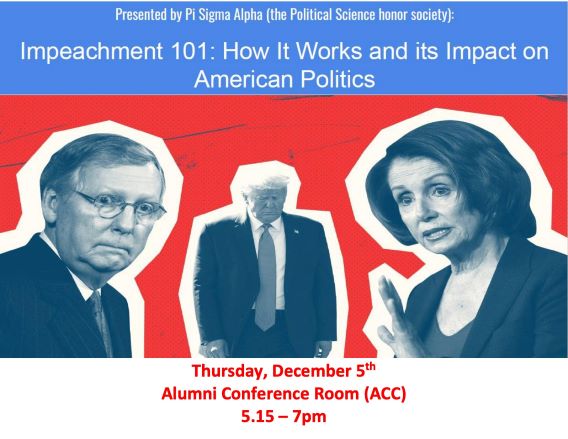
On December 5, 2019, Pi Sigma Alpha and the Political Science Department hosted a panel discussion on the impeachment process, its multiple effects on American politics, its next steps, and its international contexts. The panel featured professors Schantz, Lake, Carman, and Manzi.
The panel was covered by the Press-Republican
Professor Raymond Carman Presents on Impeachment
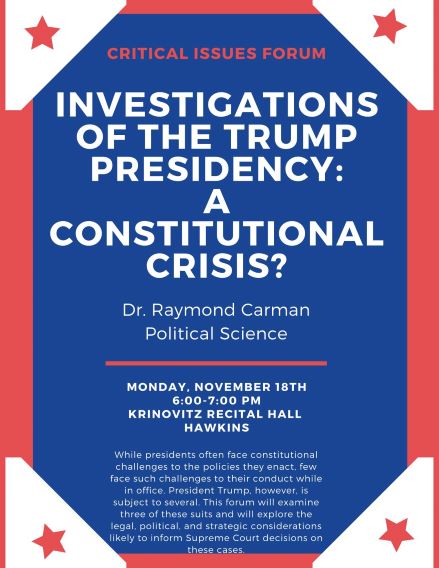
On November 18, 2019, a Critical Issues Forum featured Professor Carman presenting on the investigations of the Trump Presidency and the Constitutional implications involved.
Prof. McMahon’s PSC 374 Class Presents the “Justice & Politics” Wiki
Students in Prof. John McMahon’s Justice and Politics course last fall created a public wiki-style site on different areas of justice and political actors who work to achieve justice — racial justice, economic justice, disability justice, climate justice, etc. Students in future offerings of the course will build on and expand this project to continue creating a public resource about justice and its political manifestations. Visit the wiki to learn more.
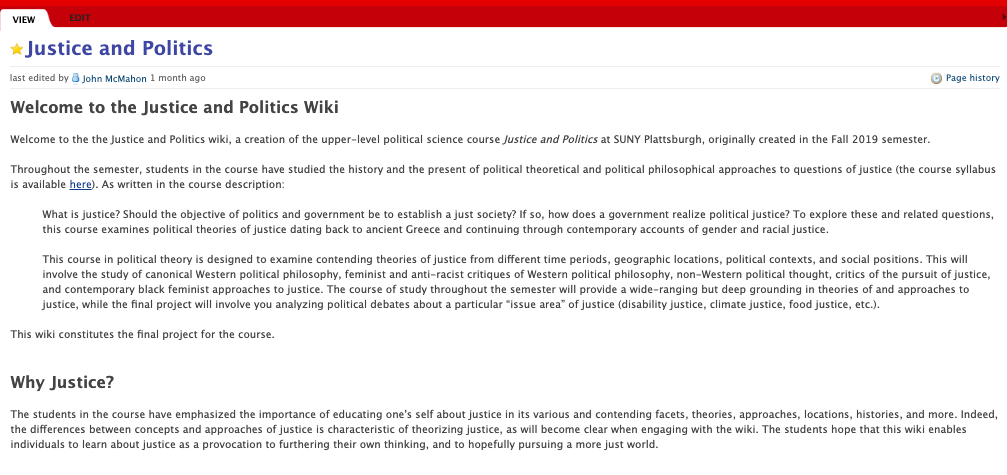
Professor Daniel Lake Presents at ISSS-IS Annual Conference in Denver
On October 18, 2019, Professor Lake presented “Technological Change and Military Transformation” at the 2019 Annual Conference of the International Security Studies Section (ISA) and the International Security and Arms Control Section (APSA) in Denver, Colorado.
Abstract
Since World War II there has been a clear shift away from the mass military model. What was once the norm, at least for militarily significant states, is now rather rare. Even major powers that still technically retain conscription, like Russia and China, do so selectively or not at all. While political and social factors such as a lack of major wars and changes in the perceived legitimacy of conscription are certainly important for understanding specific decisions to end or limit conscription, the broad scope of this trend suggests something more is at work. I argue that a critical underlying cause for the decline of the mass military model is developments in military technology. Technological change has undermined the usefulness and viability of the mass military model in two ways: by making mass less useful on the battlefield, and by making it much harder to sustain. Mass militaries have become less useful due to increases in the range, accuracy, and destructiveness of weaponry that have made the dense deployment of troops counterproductive. More importantly, increases in the complexity and cost of weapon systems since World War II have made it much more difficult to procure enough equipment to maintain a mass military equipped with modern equipment. In addition, these increasingly complicated weapons require skilled personnel to operate and maintain, undermining any benefit of conscription. These technological trends are likely to continue, resulting in a world where militaries tend to be relatively small, well-trained professional forces that are supplemented with mercenaries during times of war.
Poli Sci Department & Pi Sigma Alpha Co-Host Democratic Presidential Candidate Town Hall Watch

On October 10, 2019, the Political Science Department and Pi Sigma Alpha along with the Gender and Women’s Studies Department and Radius, co-hosted a viewing and moderated discussion of the Town Hall on LGBTQ+ issues for candidates in the Democratic Party presidential primary.
Poli Sci Department & Pi Sigma Alpha Present “Sorry to Bother You”
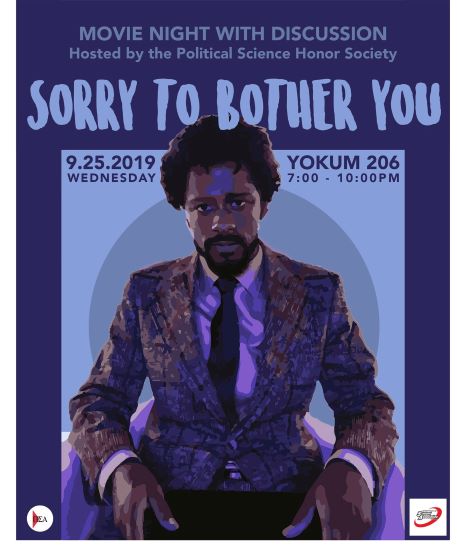
On September 23, 2019, the Political Science Department and Pi Sigma Alpha with the Student Association co-hosted a viewing of and discussion about the 2018 film “Sorry to Bother You.”
The film by director, musician, and activist Boots Riley explores the intersections of race, capitalism, gender, technology, labor, and political resistance. Riley describes it as “an absurdist dark comedy with magical realism and science fiction, inspired by the world of telemarketing,” while labor historian Robin D.G. Kelley has called it a “prescient commentary on the present” that “reveals the fundamental antagonisms in the material world.”
Professors Carman & McMahon Present on First Amendment for Constitution Day
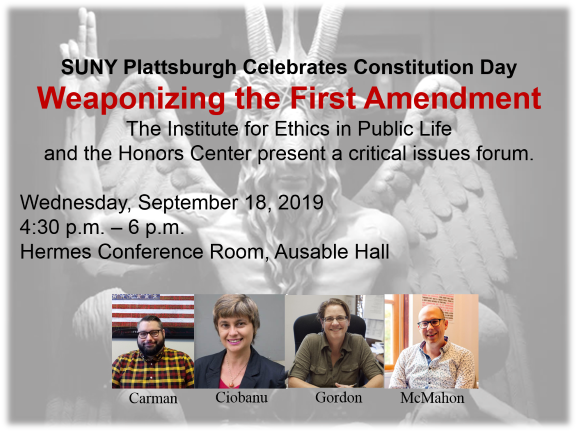
On September 18, 2019, Professors Carman and McMahon took part in a faculty panel (along with Prof. Gordon of the History Department and Professor Ciobanu of the Criminal Justice Department) on the weaponizing of the First Amendment as part of the SUNY Plattsburgh celebration of Constitution Day.
Professor John McMahon Co-Facilitates Anti-Oppression Workshops
Professor McMahon was one of the co-creators and co-facilitators of the Fall 2019 “Anti-Oppression Work at a PWI” dialogue project. The project involved students, staff and faculty using the “Circle Way” method to meet, have constructive and challenging conversations, and to engage with two anti-racist texts in order to explore pedagogy, equity, power, and racism on campus.
Professor John McMahon Presents at APSA Annual Convention in Washington, DC.
Professor McMahon presented “Tarrying with Whiteness: ‘All Lives Matter,’ White Fragility, and Phenomenologies of Whiteness in an Antiblack World” at the 2019 Annual Convention of the American Political Science Association.
Abstract
This paper involves a phenomenological analysis of two politically and culturally prominent manifestations of contemporary whiteness, ‘all lives matter’ as a response to ‘Black lives matter,’ and Robin DiAngelo’s best-selling book (2018a) on the notion of ‘white fragility.’ For both modes, following Yancy, I seek to phenomenologically “look” at whiteness in an effort, first, to counter the symptomatic white gazing enacted by the ‘all lives matter’ response and by the white person constituted by and manifesting white fragility; and second, to articulate the undergirding antiblack phenomenological process of ‘all lives matter’ and white fragility. This gazing then turns to grapple with alternative orientations for whites and whiteness, especially in terms of the possibility for a critique of white fragility to generate an antiracist being-white-in-the-world. The paper includes an analysis of whiteness in terms of racialized bad faith, habit, perception, motility, spatiality, presumed unconditioned transcendence, and more. Operating as they do at the level of the embedded self, such orientations are not easily understood by the white self in all their depth.
Professor John McMahon Publishes Article on Political Science Education
Professor McMahon published “Producing Political Knowledge: Students as Podcasters in the Political Science Classroom,” in the Journal of Political Science Education.
Abstract
Given the increasing prevalence of podcast listening, especially among young adults with college education, it is important to consider how student-produced podcasts can impact the student experience in the classroom, contribute to a more participatory course, and help achieve learning objectives. To engage these issues, this article reflects on the podcast assignment completed by five courses of students, three introductory American politics classes and two political ideologies classes. This article seeks to examine how podcasts can work as a tool for students to research, analyze, synthesize, and present political information in a specific pedagogical and rhetorical setting; in the course of doing so, students become actively engaged with the audio public political sphere. I focus on assignment design, learning objectives, and my own pedagogical reflections in order to reach some tentative ideas about the pedagogical potential of podcasts in the political science classroom.
Pi Sigma Alpha Induction Ceremony
On May 7, Pi Sigma Alpha Omicron Omega inducted its new members for 2018–2019.
Professor John McMahon’s PSC 371 Class Presents “And Still We Rise”
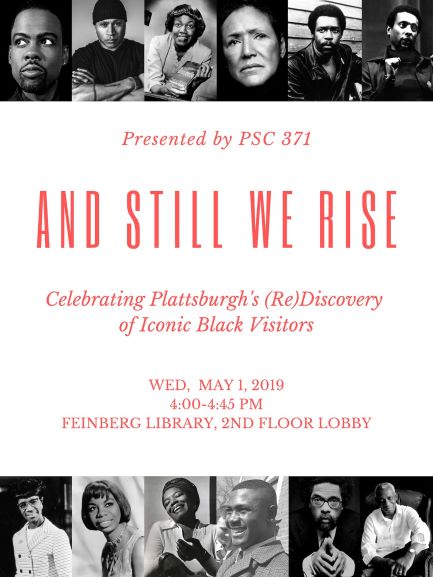
On May 1, 2019, the students of PSC371 (African-American Political Thought) gave a presentation that explored the numerous black activists and performers that have set foot on our campus throughout the decades. They examined, with the support of library staff, the impact that they left on our community, along with the messages delivered to the campus at the time of their visits. The exhibit featured performers such as Nina Simone, Chris Rock and LL Cool J, writers like Maya Angelou and Gwendolyn Brooks, and political figures and activists like Shirley Chisholm and Kwame Ture.
Professor Lucia Manzi’s Tuesday Reflections:
“Bringing Down Bribesville: The Microfoundations of Effective Corruption Prosecution”
On April 23, 2019, Professor Manzi gave a presentation as part of Tuesday Reflections called: “Bringing Down Bribesville: The Microfoundations of Effective Corruption Prosecution.”
Abstract
How can courts hold corrupt politicians accountable? In this talk, I discuss how the organizational structure of criminal courts and prosecutor’s offices can determine the success or failure of corruption prosecutions. I do so through the in-depth examination of two case studies, the criminal court in Milan and the criminal court in Rome, over the years from 1979 to 1997. My analysis shows that local judicial hierarchies allow judicial officials to exert close scrutiny over the outcome of corruption prosecutions. To the contrary, egalitarian relationships between local judicial officials and their subordinates lessen hierarchical scrutiny and provide low level judicial actors with more freedom to pursue legal innovations. These conditions explain the difference in corruption prosecutions between these two cases. While lower ranked judicial professionals in Milan dealt a fatal blow to systemic corruption in 1992, with the Clean Hands investigation, Roman judicial officials constantly worked to prevent the emergence and diffusion of effective corruption prosecution among their subordinates.
Professor Lucia Manzi Presents on Corruption Prosecution at MPSA & LSA
Professor Manzi presented “Governing the Judiciary: The Microfoundations of Effective Corruption Prosecutions” at the 2019 Annual Conference of the Midwest Political Science Association (April 4–7, Chicago, IL) and the 2019 Annual Meeting of the Law and Society Association (May 30–June 2, Washington DC).
Abstract
To this day, corruption among public officials remains a salient issue among democratic regimes in both developed and developing countries around the world. Under what conditions can judicial institutions hold corrupt politicians accountable? I answer this question through an in-depth examination of corruption prosecution in two key Italian lower courts, Rome and Milan, over the years from 1979 to 1997. My analysis shows that the effective judicial prosecution of complex criminal issues, such as systemic corruption, depends on lower courts’ internal organizational structure. Local judicial hierarchies allow judicial officials to exert close scrutiny over the outcome of judicial prosecution. To the contrary, democratic decision-making procedures for the assignment of cases and the distribution of judicial work lessen hierarchical scrutiny and allow low level judicial actors more freedom to pursue legal innovations. These conditions explain the differences in corruption prosecution between these two cases. While lower ranked judicial professionals in Milan dealt a fatal blow to systemic corruption in 1992, with the so-called Clean Hands investigation, Roman judicial officials constantly worked to prevent the emergence and diffusion of effective corruption prosecution.
Professor John McMahon Publishes Article on Domestic AI
Professor McMahon (with coauthor Amy Schiller) published: “Alexa, Alert Me When the Revolution Comes: Gender, Affect, and Labor in the Age of Home-Based Artificial Intelligence” in New Political Science.
Abstract
The fantasy of automation is one of liberation from alienating tasks. Today, domestic artificial intelligence (AI) enacts this dream of frictionlessly offloading monotony. This article deploys theories of Marxist feminism, affective labor to interrogate domestic AI’s unprecedented promise of absorbing forms of labor we hardly acknowledged that we did. While these devices make the reproductive labor of the household legible as labor, we interrogate their quasi-emancipatory promise. We argue that devices such as Amazon’s Alexa or Google Home elide and reproduce the gendered and racialized dimensions of domestic labor, streamline this labor for capture by capital, and heighten the very affective dynamics they promise to ameliorate. Only critical political theories of work can illuminate the unfulfilled transformations and ongoing dominations of gender, race, and affect that saturate labor with domestic AI — expressed, we contend, by re-articulating the framework of the “social factory” to that of the “social server.”
Professor John McMahon Presents on Racial Politics
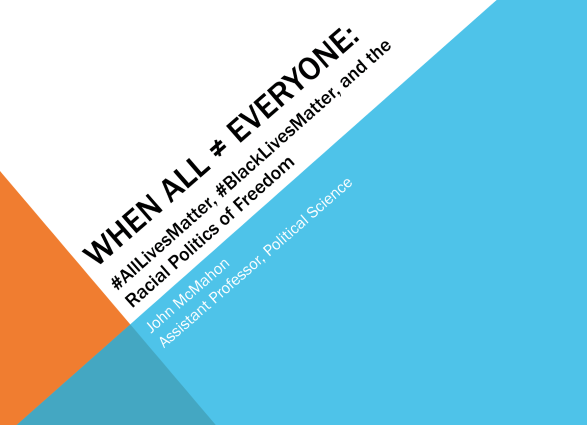
On March 26, 2019, Professor McMahon presented “When All ≠ Everyone: AllLivesMatter, BlackLivesMatter, and the Racial Politics of Freedom.” This talk critically analyzes the use of “AllLivesMatter” as a response to “BlackLivesMatter,” arguing that AllLivesMatter functions to deny recognition of, and evade responsibility for, racialized forms of violence and injustice. In response, it suggests that the ideas and movements of BlackLivesMatter offer a politics of truly universal freedom and liberation.
Professor Emeritus Thomas Konda Publishes Book on Conspiracism
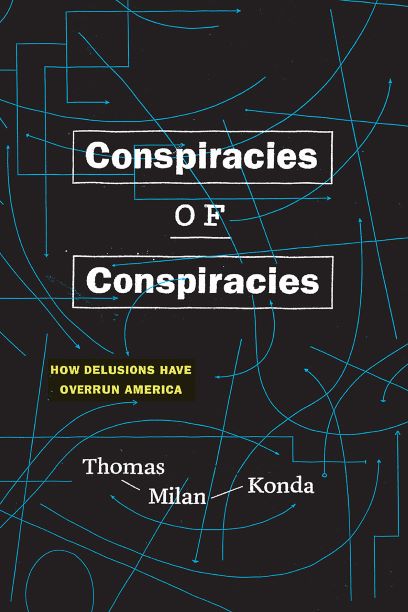
Professor Emeritus Thomas Konda’s new book, Conspiracies of Conspiracies: How Delusions Have Overrun America, was published by the University of Chicago Press.
About the book:
It’s tempting to think that we live in an unprecedentedly fertile age for conspiracy theories, with seemingly each churn of the news cycle bringing fresh manifestations of large-scale paranoia. But the sad fact is that these narratives of suspicion — and the delusional psychologies that fuel them — have been a constant presence in American life for nearly as long as there’s been an America.
In this sweeping book, Thomas Milan Konda traces the country’s obsession with conspiratorial thought from the early days of the republic to our own anxious moment. Conspiracies of Conspiracies details centuries of sinister speculations — from antisemitism and anti-Catholicism to UFOs and reptilian humanoids — and their often incendiary outcomes. Rather than simply rehashing the surface eccentricities of such theories, Konda draws from his unprecedented assemblage of conspiratorial writing to crack open the mindsets that lead people toward these self-sealing worlds of denial. What is distinctively American about these theories, he argues, is not simply our country’s homegrown obsession with them but their ongoing prevalence and virulence. Konda proves that conspiracy theories are no harmless sideshow. They are instead the dark and secret heart of American political history — one that is poisoning the bloodstream of an increasingly sick body politic.
Poli Sci Department & Pi Sigma Alpha Present “Black Panther”
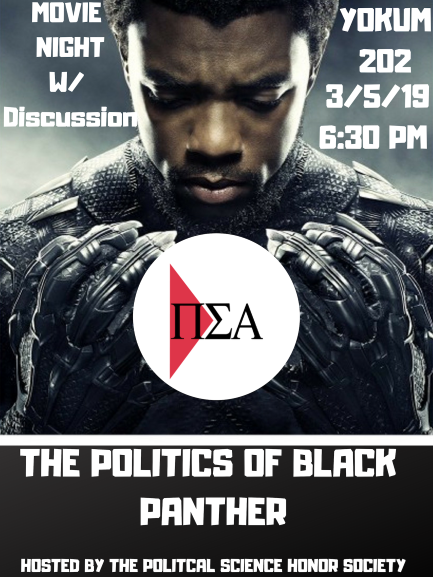
On March 5, 2019, the Political Science Department and Pi Sigma Alpha hosted a screening of the film “Black Panther” followed by a facilitated discussion on the multifaceted politics of the film.
Professor Daniel Lake Presents at ISA Annual Conference in Toronto
On March 29, 2019, Professor Lake presented “The Decline of the Mass Military” at the 2019 Annual Convention of the International Studies Association in Toronto, Canada.
Abstract
Over the last 30 years, we see signs that the era of the mass military may be ending. Mass militaries have dominated battlefields worldwide since the creation of the levee en masse, but in recent decades we are seeing a shift away from this model. Most major powers are downsizing their militaries and reducing (or ending) their reliance on conscription. While this is may be related to the lack of major wars in recent decades, I argue that a more compelling explanation for it is developments in military technology. Due to their increasing complexity, the cost of modern weapon systems has increased much faster than the rate of economic growth for decades to the point where large numbers are no longer affordable. In addition, these increasingly complicated weapons require skilled personnel to operate, and conscription is not a particularly effective way to enlist such personnel. Barring developments that make it radically easier to operate and maintain the latest weapons, this trend is likely to continue. The end result may look much like what preceded the mass military — where most militaries were small, well-trained professional forces that were extensively supplemented with mercenaries (private military corporations) during times of war.
Professor Raymond Carman Presents on Diversity on the Federal Bench
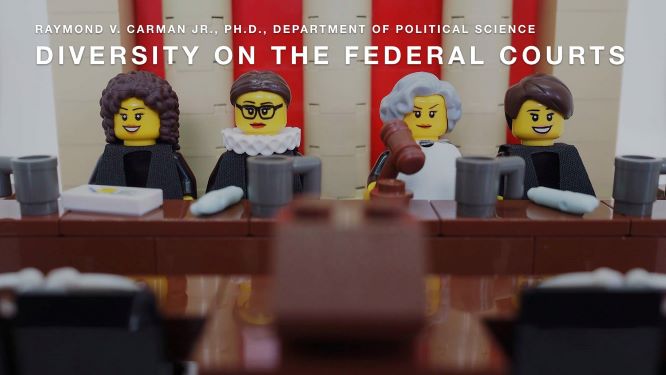
On February 27, 2019, Professor Carman presented “Diversity on the Federal Bench” as part of the Social Justice Teach-in.
Abstract
Professor Daniel Lake Publishes Book on the U.S. Military & Technology
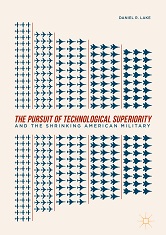
Professor Daniel Lake’s new book, The Pursuit of Technological Superiority and the Shrinking American Military, was published by Palgrave-Macmillan Press.
About the book:
Why has the U.S. military begun to suffer from overstretch in recent decades? Why is one of the largest militaries in the world, and the most expensive by far, periodically stressed by the operational demands placed upon it? This book argues that recent problems with overstretch are the result of a heavy reliance on technology to solve tactical and strategic problems. Over the last seven decades, the U.S. armed services have consistently chosen to push the technological frontier out in an effort to first gain, and then maintain, qualitative superiority over potential foes. The high procurement and support costs associated with cutting-edge weapon systems has resulted in a military that is shrinking in both absolute size and in the relative share of combat forces. The culmination of this process is a U.S. military that increasingly lacks the capacity needed to conduct operations without putting significant stress on its personnel and equipment.
Lake argues that this pattern is a manifestation of an American cultural disposition favoring technology. He shows that this affinity for technology is present in the organizational cultures of all the armed services, though not to the same degree. By examining procurement programs for each armed service, this book reveals how attempts to develop and leverage superior technology has resulted in some notable program failures, high procurement costs for the latest generation of equipment with associated production cuts, and the high support requirements that are causing the relative share of combat forces to shrink. Lake’s analysis of recent initiatives by the armed services suggests that this pattern is likely to continue, with the U.S. military remaining prone to overstretch whenever its operational tempo increases above the peacetime baseline.
Midterm Election Panel
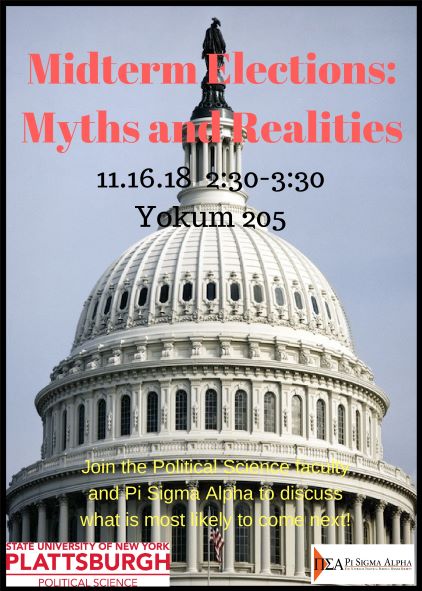
On November 28, 2018, the Political Science Department and Pi Sigma Alpha hosted a panel discussing the results, implications, and effects of the 2018 midterm election.
Panel: What Students Should Know About the Law

On September 10, 2018, the Political Science Department and Pi Sigma Alpha hosted a panel with local attorneys who are SUNY Plattsburgh Political Science alumni to inform students about their legal rights and what they need to know if they interact with police or the judicial system.
Professor Raymond Carman Publishes Book on Judicial Behavior
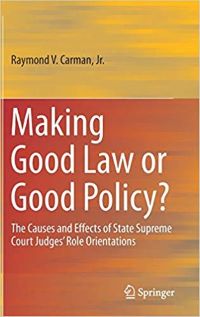
Professor Raymond V. Carman Jr.’s new book Making Good Law or Good Policy? The Causes and Effects of State Supreme Court Judges’ Role Orientations was published by Springer.
Abstract
This book uses role theory to analyze the judicial decisions made by state supreme court judges. Grounded in the fields of anthropology, business management, psychology, and sociology, role theory holds that, for each position an individual occupies in society, he or she creates a role orientation, or a belief about the limits of proper behavior. Judicial role orientation is conceptualized as the stimuli that a judge feels can legitimately be allowed to influence his or her decision-making and, in the case of conflict among influences, what priorities to assign to different decisional criteria. This role orientation is generally seen as existing on a spectrum ranging from activist to restraintist. Using multi-faceted data collection and empirical testing, this book discusses the variation in judges’ role orientations, the role that personal institutional structure and judges’ backgrounds play in determining judicial orientations, and the degree to which judges’ orientations affect their decision-making. The first study to provide cross-institutional research on state supreme court judges, this book expands and advances the literature on judicial role orientation. As such, this book will be of interest to graduate students and researchers studying political science, public policy, law, and the courts.